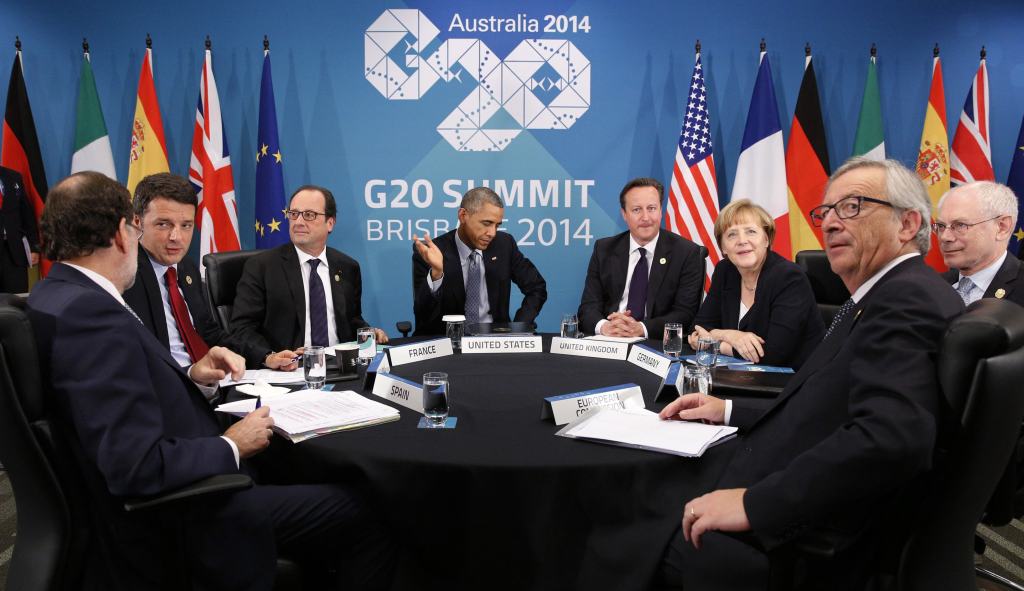Problems for emerging markets, eurozone spark worries, as Japan slips into recession
As G20 leaders stepped onto their planes Sunday night to depart Brisbane, the site of the group’s most recent summit, you could have been forgiven for thinking they felt pretty good about their day’s work.
The leaders of the most developed economies in the world had just promised to boost the global economy by US$2 trillion, thanks to supposed package of more than 1,000 measures that would “create millions of jobs.” A united front, in the face of considerable economic challenges.
But by the time many of the leaders arrived home, expecting to turn their attention to more domestic matters, much of the goodwill from the G20’s communique had evaporated as the bad news returned. First, a stark warning emerged from one of their own.
“Six years on from the financial crash that brought the world to its knees, red warning lights are once again flashing on the dashboard of the global economy.” And that was from one of the leaders who has an economy that is actually growing.
Writing in The Guardian, British Prime Minister David Cameron declared “the problems (are) plain to see.” Although primarily a domestic exercise that sought to justify his government’s policies, Cameron thought global, identifying problems in the eurozone, slowing growth in emerging markets and a backdrop of “instability and uncertainty” as prime causes for concern.
Second, in the early hours, came the news that Japan, the world’s third-largest economy, had unexpectedly slipped into recession. The country’s Gross Domestic Product (GDP) shrunk by an annualized 1.6 percent in July and September, following a whopping 7.3-percent negative tally in the second, aided by the implementation of a national sales tax.
As Tokyo’s Nikkei index scored its biggest one-day drop for months, Prime Minister Shinzo Abe admitted yesterday that GDP figures had “turned out not so encouraging.” And that warning — “not so encouraging” — could be used to describe the outlook of many economists and analysts.
“Six years on from the financial crash that brought the world to its knees, red warning lights are once again flashing on the dashboard of the global economy.”
Slowdown and stagnation
Asia’s largest two economies are among those causing concern.
Although Japan’s news was unexpected, some analysts have recognized earlier signs that consumer spending is stalling as the country’s population falls. But the fall is not just down to sales — housing and investment also fell in the last quarter.
China, which has been the leader of global growth and has become such an important source of capital in recent decades for other countries, is also facing slowing growth. While in 2010 it was scoring double-digit growth figures, this year its economy has grown an estimated 7.5 percent.
Beijing’s relationships abroad guarantees that its slowdown will in turn have an impact way beyond its borders, especially in the US, Europe and Latin America. Brazil, in particular, and most likely Argentina may feel Beijing’s pain, with China being a huge importer of raw materials. Emerging markets are another black spot on the global economic agenda, with some expecting Brazil (and its other BRICS partners) to face tough times on the horizon.
As for the rest of the G20, only the United States and, on the other side of the Atlantic, the United Kingdom are registering particularly good growth statistics at present. Concerns are especially high in Europe, where this week one financial figurehead — no less than the head of the Bank of England Mark Carney — warned that a “spectre is now haunting Europe — the spectre of economic stagnation.”
Many members of the eurozone are struggling to boost their flagging growth statistics. Many of them also have high levels of government debt, limiting spending options. Instability too is also hurting the eurozone, with the conflict in Ukraine and sanctions hitting trade.
From editorials and columns, the warnings ring out.
“Economists are warning of an extended period of stagnation unless governments act to increase potential growth,” declared one editorial published by Bloomberg today.
@urlgoeshere
Originally published in the Buenos Aires Herald, on Tuesday, November 18, 2014

